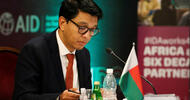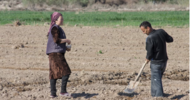Sheik Mohammed Hussein Ali Al Amoudi, the second richest person in Saudi Arabia, is preparing to farm cereals on hundreds of thousands of hectares of Ethiopian land for export to Saudi Arabia
- Addis Fortune
-
14 September 2009
South Africa is joining a “green rush” for the African continent. The Republic of the Congo has offered Agri SA 10-million hectares for South African farmers to produce maize and soya beans as well as to establish dairy and poultry farms.
- Mail & Guardian
-
08 September 2009
Private Saudi firm Planet Food World (PFWC) will invest around $3 billion in agriculture in Turkey over the next five years to export food products to the Gulf region, the head of its Turkish unit said.
Contrary to past trends, countries in the Global South are initiating much of the investment.
- Foreign Policy in Focus
-
18 June 2009
Capitalists of the world are cornering land in emerging markets. India need not wait until international agencies start lecturing us on the need for “reforms” (and FDI) in agriculture.
- Financial Express
-
03 June 2009
Pakistan dramatically increased the amount of farmland open to foreign investors to six million acres, but will require outsiders to share half of their crop with local growers, Pakistan’s investment minister told Reuters.
Saudi officials I have spoken to seem to be aware of the minefields their schemes could ignite.
- Financial Times
-
27 April 2009
Saudi Arabian investors want to lease 500,000 hectares of farmland in Tanzania to grow rice and wheat.
- The Citizen Newspaper
-
17 April 2009
The Kenyan President, Mwai Kibaki, returned from a visit to Qatar on Monday. His spokesman said the request for land in the Tana River delta, south of Lamu, was being seriously considered. “Nothing comes for free. If you want people to invest in your country then you have to make concessions,” the spokesman said.
- Guardian News and Media
-
04 December 2008
Cru, a small specialist fund management firm, recently launched a Malawi-based fund called Africa Invest. The fund has made an initial investment of £2m in 2,000 hectares of land that’s producing paprika for western supermarkets. With land prices starting at £800 per hectare (compared to £10,000 in the UK) it’s relatively easy to amass large farms that can be upgraded with new technology, mechanisation and better production methods. According to Cru, annual returns on capital should exceed 30 to 40 per cent.
- Investor Chronicle
-
15 August 2008
Companies from countries across the world have acquired fertile Nile-irrigated land for growing food crops, non-food agricultural commodities such as alfalfa, flowers, tobacco, and biofuels, rearing livestock and logging trees.
- Pulitzer Center
-
01 February 2020
Land and water grabs spell disaster for rural people and rivers
- International Rivers
-
14 September 2011
"What Karuturi is doing is what Africa needs, wants and deserves," says Ram Karuturi. Yet 400 Ethiopians have signed a petition saying they received no compensation after being evicted from land taken over by Karuturi.
Saudi Star Agricultural Development PLC is reported to have donated 26 tractors and 30M Birr to Gambella regional state local farmers and youth, where it has acquired a 60-year concession for 10,000 ha.
- Gambella Media
-
13 June 2015
Indigenous Ethiopians demand a stop to human rights abuses stemming from agricultural investment policies
- Oakland Institute
-
05 February 2013
New book explains the reasons behind the land grab phenomenon and why so many Ethiopians are not only alarmed but also adamantly opposed to it.
- Ethiopian Review
-
11 October 2011
Indian companies are among the biggest land holders in the African country through deals concluded in dubious circumstances
- The Hindu
-
19 February 2013
Largest cut flower exporter Karuturi Global ventures into food business
- Business Today
-
28 Mar 2012
The global rush to acquire agricultural land in bountiful Africa evokes concern and protests.
African countries are also welcoming big agricultural projects bankrolled by foreign investors whose goal is to send food abroad.
- Foreign Policy
-
18 December 2013
Women, who are already compensating for rising food prices and energy costs with additional time and labor, are now further disadvantaged through land grabbing.
- TrustLaw
-
16 February 2012
Indian companies acquire land in Africa at throw away prices to ensure India's food security. Prof Jayati Ghosh analyses the issue and offers alternative solutions.
- Newsclick
-
12 September 2011
Many small Ethopian farmers do not share their leaders' enthusiasm for leasing off farmland to foreign investors
Ramakrishna Karuturi does not feature on any international power list. Perhaps he should.
- Times of India
-
26 September 2009
Civil society, including African farmers unions, need to educate local people that such land deals are not in their interests, however couched in 'win-win' terminology they appear to be.
A year ago today, Ethiopian security forces arrested Pastor Omot Agwa and six colleagues at Addis Ababa’s Bole Airport on their way to a food security workshop and took them to the notorious Maekelawi police station, where torture is routine.
Controversial farmland deals in developing countries can have a negative impact on the people who live on the land, according to a new U.N. report.
The fact that China does not now depend on Africa in any meaningful way for food does not mean this will continue to be the case.
Everywhere in Africa the story is more or less the same: communal rights are being grossly interfered with, farming systems upturned, livelihoods decimated, and water use and environments changed in ways which are dubiously sustainable.
- Wealth of the Commons
-
09 May 2013
New GRAIN study finds changed conditions in international “land grabs.”
- Circle of Blue
-
24 June 2016















